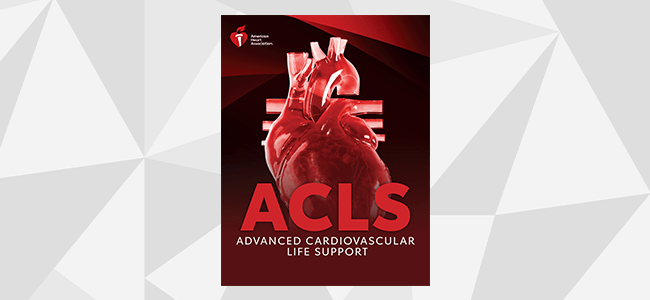Suporte avançado de vida cardiovascular
(ACLS) Provider Course
The AHA's Advanced Cardiovascular Life Support (ACLS) provider course builds on the foundation of lifesaving Basic Life Support (BLS) skills, emphasizing the importance of continuous, high-quality CPR. The hands-on instruction and simulated cases in this advanced course are designed to help enhance skills in the recognition and intervention for adult cardiac arrest, stroke, and other cardiopulmonary emergencies through early recognition and time-sensitive intervention by high-performance teams. The AHA's ACLS course has been updated to reflect science and education from the American Heart Association 2025 Guidelines for Cardiopulmonary Resuscitation and Emergency Cardiovascular Care.
This is the International version of the ACLS Course. The training materials have been adapted to include metric units of measure and other references that apply to students outside the U.S. and Canada.

Supported Languages
Inglês internacional
Formats Available
- Instructor-led training (ILT)
- Blended learning – HeartCode® ACLS + hands-on skills session training
- Resuscitation Quality Improvement® (RQI®)
- Apply the basic life support (BLS), primary, and secondary assessments sequence for a systematic evaluation of adult patients
- Discutir sobre como o uso de uma equipe de resposta rápida (RRT) ou equipe médica de emergência (MET) pode melhorar os resultados de pacientes
- Discuss early recognition and management of ACS, including appropriate disposition
- Discuss early recognition and management of stroke, including appropriate disposition
- Reconhecer bradicardias e taquicardias que possam resultar em PCR ou complicar o resultado da ressuscitação
- Realizar o gerenciamento precoce de bradicardias e taquicardias que possam resultar em PCR ou complicar o resultado da ressuscitação
- Modelar comunicações eficazes como membro ou líder de uma equipe de alto desempenho
- Reconhecer o impacto da dinâmica de equipe no desempenho geral da equipe
- Reconhecer uma parada respiratória
- Realizar o gerenciamento precoce de paradas respiratórias
- Reconhecer PCR
- Perform prompt, high-quality BLS, including prioritizing early chest compressions, ventilation, and integrating early automated external defibrillator (AED) use
- Perform optimized management of cardiac arrest until termination of resuscitation or transfer of care, including post–cardiac arrest care
- Evaluate resuscitative efforts during a cardiac arrest through continuous assessment of cardiopulmonary resuscitation (CPR) quality, monitoring the patient’s response, and delivering real-time feedback to the team